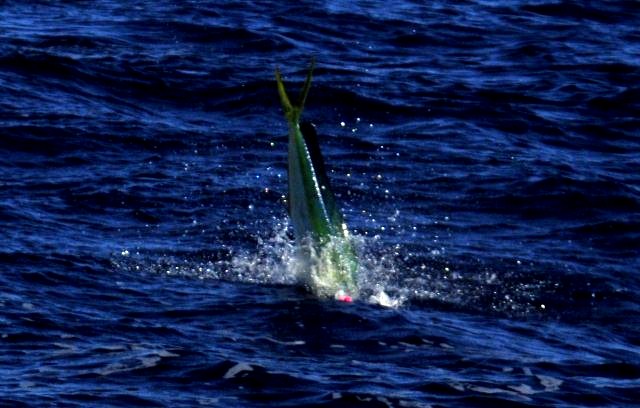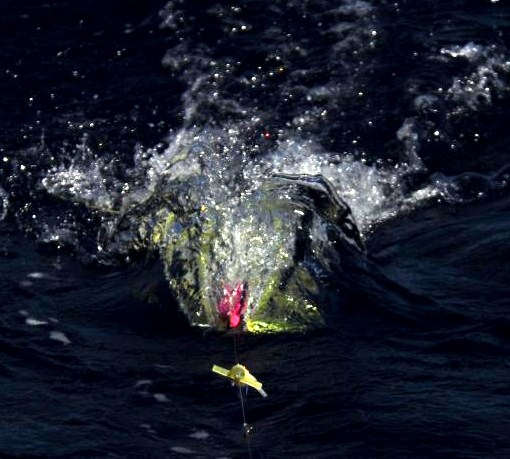Our 1st Mahi-Mahi

|
Our First
Mahi-Mahi
    About a hundred and twenty miles into our really cracking sail to Grand Turk, the troll went busy. I let the line run as usual, then put on the clamp - testing to see what 'pressure' was there - all of a sudden a VERY cross mahi-mahi took off, leaping about three feet in the air. Bear ran for the cameras and I began the fifteen minute fight with this angry chap. Bear did really well to get these shots. He never jumped quite as high but did put on a good show for us.

The mahi-mahi (in Hawaiian)
- (Coryphaena hippurus) is
commonly known as the dolphin-fish. In other languages it is
known as lampuga, lampuka, rakingo, calitos, maverikos and dorado. These are surface-dwelling ray-finned
fish found in off-shore temperate,
tropical
and subtropical
waters worldwide. They are one of only two members of the Coryphaenidae
family, the other being the pompano
dolphinfish. Mahi-mahi means very strong in Hawaiian.
Linnaeus
named the genus, derived from the Greek word, koryphe, meaning top or apex, in
1758. Synonyms for the species include Coryphaena argyrurus, Coryphaena chrysurus and Coryphaena dolfyn.
 The Mahi-mahi lives four to five years. Catches average fifteen to twenty nine pounds, seldom exceeding thirty three and any mahi-mahi over forty pounds is exceptional. The fish has a compressed body and long dorsal fins extending nearly the entire length of their body. Their anal fins are sharply concave. They are distinguished by dazzling colors: golden on the sides and bright blues and greens on their sides and back. Mature males have prominent foreheads protruding well above the body proper. Females have a rounded head. Females are usually smaller than males. Out of the water, the fish often change colour among several hues (giving rise to their Spanish name, dorado maverikos, "golden maverick"), finally fading to a muted yellow-grey upon death.
 Mahi-mahi is among the fastest-growing fish. They spawn in warm ocean currents throughout much of the year and their young are commonly found in seaweed. Mahi-mahi are carnivorous, feeding on flying fish, crabs, squid, mackerel and other forage fish. They have also been known to eat zooplankton and crustaceans. Rather like Bear huh. Cheek
 The mahi-mahi's taste resembles other whitefish, such as flounder and tilapia. Our first taste was with Nimue, I was uncertain as not being a "fishy" person. I was impressed with the meatiness and the fact that after cooking it holds together, not breaking up like cod. In fact I think if you put apple sauce on the meat you could kid many people that it is pork on the plate - the main reason I love the ‘meat’ is it is not ‘fishy’ and doesn’t smell like old prawns and bad socks as many fish do. Looking forward to eating one set of steaks cold with salad and potato, one set in a curry and one set not sure just yet.

Mahi-mahi are highly sought for sport fishing and commercial purposes. We could see why, even after he tired he kept fighting us in the cockpit. Even trying to resist the gin. Eventually he gave up knowing little would be wasted. Bear had been a cracking Beautiful Assistant so got to have the photo op. Oh and the new gaff was first class. Sadly, I was not allowed to put the troll out again for the rest of the journey - two more days.

ALL IN ALL A SPLENDID CATCH VERY EXCITING AND FANTASTIC COLOURS |
